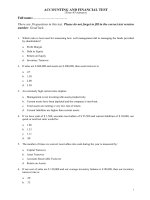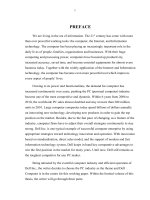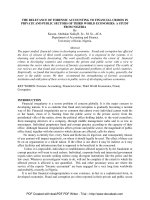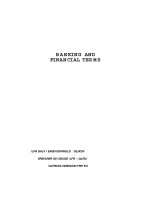COMPUTER CRIME, FRAUD AND FINANCIAL CRIME
Bạn đang xem bản rút gọn của tài liệu. Xem và tải ngay bản đầy đủ của tài liệu tại đây (124.87 KB, 14 trang )
UNIT 12 COMPUTER CRIME, FRAUD AND FINANCIAL CRIME
Read the text and decide if you agree or disagree with the statements below.
Leeson paid £61,000 for speech
Adapted from the BBC web-site Business: Your Money (October 1999)
Disgraced former Barings trader Nick Leeson has been paid $100,000 (£61,000) to speak at
a business conference in the Netherlands.
It was the first in a long line of lucrative celebrity-style appearances planned by the man
who single-handedly brought down Barings Bank.
He will also be endorsing products in advertisements and appearing on television shows.
Business people, brokers and bankers paid about £188 each to hear him speak at the event in
the Netherlands. Leeson was released from a Singapore jail four months ago after serving
three-and-a-half years of a six-and-a-half-year sentence for fraud. He was caught after going
on the run when his gambling on derivatives markets landed Barings Bank with £800m of
debt. Now, Leeson's assets are frozen and he has huge debts hanging round his neck.
He said: "I would like to go back into the financial world, but which company is going to be
brave enough to employ me? Who will let me trade again?"
Leeson has written a book of his story, "Rogue Trader", which was made into a film,
starring Ewan McGregor and Anna Friel. But his public relations adviser, Ian Monk, says
Leeson did not gain a
penny from either, because it went directly to Barings' creditors. Under an agreement with
the creditors, he will be allowed to keep 35% of money earned from public and media
appearances and advertising. The remaining 65% will go to creditors. Some of his portion of
the money will go on medical bills. Leeson found out while in prison that he has colon
cancer. After treatment, he is now in remission. Leeson also receives a monthly allowance of
£3,000 a month from his frozen assets. "This man is inundated with offers. It's great," said
Mr Monk. Asked where he wanted to be in 10 years' time, Leeson replied: "I hope I'm still
alive. " I would like to live with somebody, have children and be left alone."
Leeson spoke about his view of world stock markets to 250 members of the Amsterdam
stock exchange. It was a Dutch group, ING, which bought up Barings after its collapse and
bailed it out.
Activity 1 Agree or disagree?
1= Agree very strongly 2= Agree 3= Not sure 4 = Disagree 5= Disagree strongly
1. Nick Leeson is a dangerous criminal and should be more carefully monitored.
2. He has served his sentence according to the law and should be allowed to get on with his
life.
3. Nick Leeson should not receive anything other than the bare minimum to live until he has
paid as much of the debt as possible.
4. 35% of his earnings is too much to be allowed to retain.
5. The fact that he can employ a PR adviser suggests that he has a good life style.
6. He should be obliged to pay for all medical treatment even if it is usually free.
7. No decent company would ever employ him to trade.
8. ING Bank should apply for a "restriction order" against him.
9. No decent person from the financial world could gain anything from such a crook.
10. Barings Bank was foolish in allowing one man the chance to “gamble” with their money.
Exercise 1
Match these definitions with one of the words underlined in the text.
1. to rescue from a tricky situation =
2. amount of money received but not necessarily earned =
3. persons who are owed money officially, e.g. after bankruptcy of a company =
4. bonds and other negotiable financial instruments =
5. dealers in bonds and other financial instruments =
6. to purchase completely ("lock, stock and barrel"), especially after a financial collapse or
company bankruptcy =
7. evading the police and other authorities =
8. to support or to promote =
9. as a great burden or load to carry =
10. financial resources (wealth) =
Discussion
What are credit cards? How do people obtain them legally?
How can they be illegally used?
What is the link between credit cards and the Internet?
How is this aspect of legitimate business likely to develop in Romania?
How might this bring a growth in a new type of crime?
Exercise 2 Credit card fraud as organised crime
Adapted from an article in “Nexus” the bulletin of the UK National Criminal Intelligence Service
(NCIS) Autumn 2001
In each of the lines 1-25, there is ONE word omitted. Suggest one correct word for each
line. The place is marked with *
1. Losses identified * credit card issuers in UK – usually banks and building societies-
2. grew from under ₤190 million pounds in 1999 * around ₤300 million in 2000.These
3. figures include plastic fraud as, for example, the fraudulent use * individual cards
4. stolen * a handbag to the sophisticated remote technology to retrieve card data from
5. computerised storage facilities of some international merchants and *. The two types
6. of CCF identified * the most attractive to organised crime are specifically the
7. counterfeiting of cards and fraud * a CNP (card not present) environment such as
8. telephone order and internet mail-order. Proof of * involvement of organised crime in
9. plastic fraud is not * anecdotal nor is it difficult to verify. UK NCIS strategic
10. intelligence reports * a significant number of crime groups whose primary interest is
11. CC crime. * is also an alarming number of crime groups for whom CC crime is a
12. secondary interest. The new modus operandi also indicate well-* criminal enterprises.
13. For example, recently there have * attacks on the on-line gaming industry-
14. betting * football, horse racing and other sporting activities), multiple attacks on
15. stored data from some major European hotel * and transport companies and
16. attacks * the ATM systems in Britain and abroad. These crimes require technological
17. expertise, capital investment in technology and global * to “spread” the
18. fraudulent *.
19. When NCIS first started * collate intelligence on card fraud, the information seemed
20. to suggest * most of the criminals originated from South-East Asia. This may have in
21. part been * to the legitimate hologram-making businesses in Hong Kong. It may also
22. have been because of many Chinese criminal * predisposition for existing
23. types of financial crime. However, by the late 1990s, it had * apparent that this
24. criminal group had saturated its own market and had started to look * its own
25. ethnic group * recruits.
Exercise 3 Front-line fraud
Now put these sentences in the best sequence to complete the “picture”.
1 2 3 4 5 6 7 8
F
A. Two such environments were readily identifiable – petrol stations and restaurants.
B. In such places the staff usually received low wages, were possibly temporary or transient
and likely to be under-supervised.
C. They had to find “front-line fraudsters” (those who attempt the fraud in the shop or other
retail environment).
D. Access to a network of vulnerable retail networks was needed.
E. These customers would be less likely to notice the card “compromises” than customers
in a familiar shopping environment.
F. The Chinese gangs sought out other ethnic groups, especially illegal immigrants as they,
or even their families, are most vulnerable.
G. Both networks have the added advantage of being used by legitimate transient customers
and tourists.
H. Some poorly-paid employment environments are also more likely to be staffed by the
less-skilled and less well-educated.
Exercise 4
Card fraudsters prey on high-class diners
Patrick Collinson, Guardian Weekly –November 2002
Put the verbs given to you in brackets in the correct form.
Plastic card fraud (1) (jump)______________ by more than 50% over the past two years to
L430m, banks said this week, warning that "skimming" (2) (reach) ____________epidemic
levels, particularly in the London area.
Skimming - the copying of a card's black magnetic strip - barely (3)
(exist)_______________ five years ago but netted L161m for criminal gangs in the year to
August 2002, according to the Association for Payment Clearing Services (APACS).
A third of that (4) (take)_______________ from card users in London, with fraudsters
targeting high-class restaurants in the capital. Second worst hit was Birmingham, where
losses from skimming (5) (be) ________________L6.6m.
An unscrupulous restaurant waiter processes a transaction but then, out of sight of the
customers, separately records the card's data on tiny devices that can be fitted on to a trouser
belt. He or she then (6)(sell) _________________the data to criminal gangs who (7) (use)
______________ it to mass-produce counterfeit credit and debit cards.
Cardholders are often unaware of the fraud until a bank statement
(8)(arrive)________________ detailing purchases they (9) (not
make)____________________ .
In the latest twist, fraudsters (10) (begin) _________________ attaching fake swipe
machines to the doors of bank ATM lobbies used by customers to gain entry at evenings or
weekends. The fake swipe devices (11) (remove) __________________ later, containing
thousands of customers' details.
APACS said this week that it hopes to beat the fraudsters with a dual strategy of PIN
numbers, first (12) (introduce) ________________ in France more than a decade ago, and
"smart card" technology.
Customers paying by card will no longer have to sign receipts at shop tills but will instead
type a four-digit PIN number into a keypad. Cardholders also (13) (issue)
________________with new-style cards that contain computer chips. These are more
difficult to copy than traditional cards.
To avoid fraudsters targeting overseas markets instead, Mastercard and Visa (14)
(coordinate) _________________an international roll-out of chip and PIN cards. By the end
of 2005 these (15) (replace) __________________ the 1 billion-plus plastic cards currently
in circulation.
Activity 2
Some shops in Bucharest accept credit cards such as VISA or MASTERCARD. Imagine a
dialogue between two criminals, one of whom works as an assistant in an expensive
clothes shop, suggesting ways they can make money out of “borrowing” credit card
information from legitimate customers. How might they also get hold of (i.e. steal!) the
credit card.
Try to think of the dialogues and the scenarios. If you can think of 2 or 3 ways, the real
crooks will think of more “scams”!
Exercise 5 Common Internet Fraud Schemes
Read the descriptions (1-7) of the different frauds. There are 7 "victim" situations described
(A-G). Identify which type of fraud (1-7) is involved with each situation (A-G)
1 2 3 4 5 6 7
1. Online Auction/Retail
The fraud attributable to the misrepresentation of a product advertised for sale through an Internet
auction site or the non-delivery of merchandise or goods purchased through an Internet auction site
2. Investment Fraud
An offer that uses false or fraudulent claims to solicit investments or loans, or that provides for the
purchase, use, or trade of forged or counterfeit securities.
3. Business Opportunity/ "Work at Home"
The offer of a “phony” job opportunity, often with associated charges such as "processing or
application" fees. Perpetrators frequently forge the name of a computer service or Internet Service
Provider.
4. Financial Institution Fraud
Misrepresentation of the truth or concealment of a material fact by a person to induce a business,
organization, or other entity that manages money, credit, or capital to perform a fraudulent activity.
5. Credit Card Theft/Fraud
The unauthorized use of a credit/debt card or credit/debt card number to fraudulently obtain money
or property. Credit/debt card numbers can be stolen from unsecured web sites.
6. Ponzi/Pyramid Schemes
An investment scheme in which investors are promised abnormally high profits on their investments.
No investment is actually made. Early investors are paid returns with the investment money received
from the later investors. The system usually collapses, and the later investors do not receive
dividends and lose their initial investment.
7. Non-Delivery of Goods/Services
The non-delivery of goods or services which were purchased or contracted remotely through the
Internet, independent of an Internet auction.
A. " My girlfriend or rather ex-girlfriend bought some clothes using my card."
B. " I saw this advertisement on a web-site, offering really high profits for a small
investment. I transferred US1000 and I haven't heard anything since! Neither have lots more people, I
understand!"
C. "I have a computer and Internet at home and this Internet company said I could compose advertising
texts for them and be paid for them. But they charged me 50US$ for their application form and another
US$50 for "distribution of my credentials" and I haven't heard from them since."
D. "Well, you know I like to collect coins. There was a great selection in an on-line auction. I paid 200US$
for what was described as a 'Charles 1 token'. The Internet picture was certainly Charles I, but when the
coin arrived it was quite different...and virtually worthless!"









